.gif)
Kerala Institute of Local Administration (KILA)
Encyclopedia
Kerala Institute of Local Administration (KILA) is an autonomous training
, research
and consultancy organisation constituted under the Ministry of Local Self Government, Government of Kerala
, registered as per Travancore – Cochin Literacy, Scientific and Charitable Societies Act-1995. KILA was established in 1990, in the pattern of a national institute, with the main objective of strengthening decentralization
and local governance.
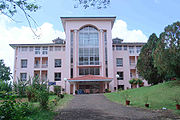 Two fully furnished guest houses which can accommodate 200 participants at a time, an auditorium with 500 seating capacity
Two fully furnished guest houses which can accommodate 200 participants at a time, an auditorium with 500 seating capacity
, an International Seminar Hall for 100 persons, a Conference room for 30 participants, 5 training halls altogether accommodates around 200 participants, one computer center with 20 computers provided with broadband internet connection etc. are some among them. Two dining halls that can accommodate 200 persons at a time are there on the campus to feed the participants.All training halls are provided with computers and LCD projectors to aid the training.
KILA office has a good local area network for its administration, internet connection, printers and all accessories essential fore a training institute.
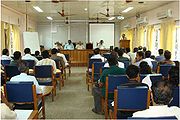 With a view to develop it as an institution of excellence, KILA was registered as an autonomous institution under the Travancore-Cochin Literary, Scientific and Charitable Societies Act 1955. KILA is the only Institution in India
With a view to develop it as an institution of excellence, KILA was registered as an autonomous institution under the Travancore-Cochin Literary, Scientific and Charitable Societies Act 1955. KILA is the only Institution in India
that functions with the sole mandate of promoting decentralised governance both in urban and rural areas. As a result of this, efforts are on to establish KILA as an international training centre on local governance and declare KILA as the SAARC centre of excellence in local governance.
since its establishment in 1990.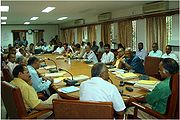 The Institute is supported by the Government of Kerala, as its nodal institution for training, research and consultancy for the Local Self-Government Institutions. The Institute engages in different capacity building activities of the local governments, both rural and urban.Training continues to be the dominant activity of KILA, with an out turn of around one lakh trained manpower in Kerala
The Institute is supported by the Government of Kerala, as its nodal institution for training, research and consultancy for the Local Self-Government Institutions. The Institute engages in different capacity building activities of the local governments, both rural and urban.Training continues to be the dominant activity of KILA, with an out turn of around one lakh trained manpower in Kerala
. The institute conducted a few research studies and brought out as reports and working papers.
Majority of the training
programmes are of short duration ranging from one day to five days at a stretch. But some training programmes stretch for a month. A Certificate Course on Panchayati Raj was a one month long programme for elected representatives.
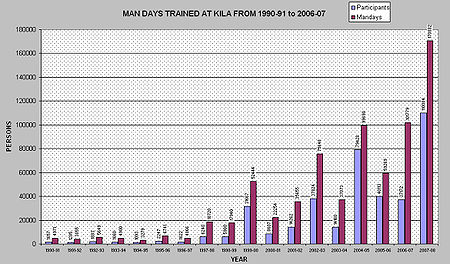
The theme, objectives, category of participants and such other details on the training programmes are available from the training calendar. The chart on the right side of this page shows the gradual growth of training programmes conducted in the institute.
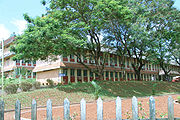 training programmes and workshops through a number of publications. In order to meet the training needs of the participants from other Indian states and neighbouring countries KILA has translated several documents in English and other Indian languages like Hindi
training programmes and workshops through a number of publications. In order to meet the training needs of the participants from other Indian states and neighbouring countries KILA has translated several documents in English and other Indian languages like Hindi
, Tamil
, Bengali
and Kannada.
A list of publications is available at the publication page of KILA website
, data
and knowledge
on decentralisation
and local governance. It aims to provide right information, to the right users, at the right time, through an array of direct or indirect information services.
The precise objective of the library
is to acquire all relevant data, information and documents pertaining to the academic activities of the Institute.
KILA Library holds books, reports, journals
and other documents in print or digital form. It creates and distributes a few cd-rom publications and offer phone-in-service on local governance. The division is engaged in promoting digital archiving technologies in sectors closely related to local governance and has evolved a methodology and manual for digital archiving with free software
Winisis, Genisis & Greenstone.
The Library & Information Division brought out many documents and manuals for promoting the use of information technologies to support and to bring about local governance in Kerala
, as part of its library extension services.
The two cd-rom publications prominent among them are:-
More than two dozen CD-ROM libraries containing around 5000 digital documents are distributed as part of the library services on no-profit basis. Most prominent among them is Community Development Library containing 1785 documents of around 1.6 lakh pages.
Maual on Digital Document Archiivng is a publication of KILA intended to promote the concept of digital document archiving using free software tools promoted by Unesco
.
Training
The term training refers to the acquisition of knowledge, skills, and competencies as a result of the teaching of vocational or practical skills and knowledge that relate to specific useful competencies. It forms the core of apprenticeships and provides the backbone of content at institutes of...
, research
Research
Research can be defined as the scientific search for knowledge, or as any systematic investigation, to establish novel facts, solve new or existing problems, prove new ideas, or develop new theories, usually using a scientific method...
and consultancy organisation constituted under the Ministry of Local Self Government, Government of Kerala
Government of Kerala
The Government of Kerala is a democratically elected body that governs the State of Kerala, India for a period of 5 years. The state government is headed by the Governor of Kerala as the nominal head of state, with a democratically elected Chief Minister as real head of the executive. The state...
, registered as per Travancore – Cochin Literacy, Scientific and Charitable Societies Act-1995. KILA was established in 1990, in the pattern of a national institute, with the main objective of strengthening decentralization
Decentralization
__FORCETOC__Decentralization or decentralisation is the process of dispersing decision-making governance closer to the people and/or citizens. It includes the dispersal of administration or governance in sectors or areas like engineering, management science, political science, political economy,...
and local governance.
Objectives
The exact objectives, included in the Memorandum of Association and Rules of the Institute issued as a Government Order (MS) No 139/90/LAD dated 13 September 1990, are as follows:-- to undertake and assist in the organisation of training and study courses,conferences,workshops,seminars etc. for the functionaries of the Panchayat Department and the local bodies,non-officials such as Members of Legislative Assembly, Members of Parliament, Panchayat Presidents and other non-officials concerned with Administration of Local bodies.
- to undertake, aid ,promote and co-ordinate research through its own or through other agencies.
- to establish centres for study and orienting training and instruction ,research and evaluation and such other activities as may be necessary.
- to analyse and propose solutions of specific problems encountered in the implementation of programs of panchayats and other local bodies.
- to act as an advisory agency to the State Government in the area of Panchayati Raj and local administration , to establish and maintain libraries and information services.
- to collaborate with other institutions ,associations and societies in India and abroad interested in similar objects and to establish and to offer fellowships, scholarships, prizes etc. in furtherance of the objects of the society.
Physical facilities
KILA, situated in an 8 hectare green campus, has excellent physical facilities needed for a well-equipped training institution.
Seating capacity
Seating capacity refers to the number of people who can be seated in a specific space, both in terms of the physical space available, and in terms of limitations set by law. Seating capacity can be used in the description of anything ranging from an automobile that seats two to a stadium that seats...
, an International Seminar Hall for 100 persons, a Conference room for 30 participants, 5 training halls altogether accommodates around 200 participants, one computer center with 20 computers provided with broadband internet connection etc. are some among them. Two dining halls that can accommodate 200 persons at a time are there on the campus to feed the participants.All training halls are provided with computers and LCD projectors to aid the training.
KILA office has a good local area network for its administration, internet connection, printers and all accessories essential fore a training institute.
Organisational Pattern
KILA was established in the pattern of a national institute with the main objective of training, research and consultancy in decentralised governance and administration.
India
India , officially the Republic of India , is a country in South Asia. It is the seventh-largest country by geographical area, the second-most populous country with over 1.2 billion people, and the most populous democracy in the world...
that functions with the sole mandate of promoting decentralised governance both in urban and rural areas. As a result of this, efforts are on to establish KILA as an international training centre on local governance and declare KILA as the SAARC centre of excellence in local governance.
Overview of activities
KILA has been engaged in the capacity building activities for local governments in KeralaKerala
or Keralam is an Indian state located on the Malabar coast of south-west India. It was created on 1 November 1956 by the States Reorganisation Act by combining various Malayalam speaking regions....
since its establishment in 1990.

Kerala
or Keralam is an Indian state located on the Malabar coast of south-west India. It was created on 1 November 1956 by the States Reorganisation Act by combining various Malayalam speaking regions....
. The institute conducted a few research studies and brought out as reports and working papers.
Majority of the training
Training
The term training refers to the acquisition of knowledge, skills, and competencies as a result of the teaching of vocational or practical skills and knowledge that relate to specific useful competencies. It forms the core of apprenticeships and provides the backbone of content at institutes of...
programmes are of short duration ranging from one day to five days at a stretch. But some training programmes stretch for a month. A Certificate Course on Panchayati Raj was a one month long programme for elected representatives.
Training programmes
The training programmes offered by KILA are:
- Trainers Training Programme
- Panchayat to Panchayt Programme
- Certificate Course for Elected Representatives
- national Level Course on Decentralised Governance
- International Course on Decentralisation
- Off-Campus Training Programme
- Decentralised Training for Local Government Functionaries
The theme, objectives, category of participants and such other details on the training programmes are available from the training calendar. The chart on the right side of this page shows the gradual growth of training programmes conducted in the institute.
Publications
The Institute disseminates the insights of research and recommendations of its various
Hindi
Standard Hindi, or more precisely Modern Standard Hindi, also known as Manak Hindi , High Hindi, Nagari Hindi, and Literary Hindi, is a standardized and sanskritized register of the Hindustani language derived from the Khariboli dialect of Delhi...
, Tamil
Tamil language
Tamil is a Dravidian language spoken predominantly by Tamil people of the Indian subcontinent. It has official status in the Indian state of Tamil Nadu and in the Indian union territory of Pondicherry. Tamil is also an official language of Sri Lanka and Singapore...
, Bengali
Bengali language
Bengali or Bangla is an eastern Indo-Aryan language. It is native to the region of eastern South Asia known as Bengal, which comprises present day Bangladesh, the Indian state of West Bengal, and parts of the Indian states of Tripura and Assam. It is written with the Bengali script...
and Kannada.
A list of publications is available at the publication page of KILA website
Library & Information Services
KILA Library & Information Division is the centre for collection, organization and dissemination of informationInformation
Information in its most restricted technical sense is a message or collection of messages that consists of an ordered sequence of symbols, or it is the meaning that can be interpreted from such a message or collection of messages. Information can be recorded or transmitted. It can be recorded as...
, data
Data
The term data refers to qualitative or quantitative attributes of a variable or set of variables. Data are typically the results of measurements and can be the basis of graphs, images, or observations of a set of variables. Data are often viewed as the lowest level of abstraction from which...
and knowledge
Knowledge
Knowledge is a familiarity with someone or something unknown, which can include information, facts, descriptions, or skills acquired through experience or education. It can refer to the theoretical or practical understanding of a subject...
on decentralisation
Décentralisation
Décentralisation is a french word for both a policy concept in French politics from 1968-1990, and a term employed to describe the results of observations of the evolution of spatial economic and institutional organization of France....
and local governance. It aims to provide right information, to the right users, at the right time, through an array of direct or indirect information services.
The precise objective of the library
Library
In a traditional sense, a library is a large collection of books, and can refer to the place in which the collection is housed. Today, the term can refer to any collection, including digital sources, resources, and services...
is to acquire all relevant data, information and documents pertaining to the academic activities of the Institute.
KILA Library holds books, reports, journals
Academic journal
An academic journal is a peer-reviewed periodical in which scholarship relating to a particular academic discipline is published. Academic journals serve as forums for the introduction and presentation for scrutiny of new research, and the critique of existing research...
and other documents in print or digital form. It creates and distributes a few cd-rom publications and offer phone-in-service on local governance. The division is engaged in promoting digital archiving technologies in sectors closely related to local governance and has evolved a methodology and manual for digital archiving with free software
Free software
Free software, software libre or libre software is software that can be used, studied, and modified without restriction, and which can be copied and redistributed in modified or unmodified form either without restriction, or with restrictions that only ensure that further recipients can also do...
Winisis, Genisis & Greenstone.
The Library & Information Division brought out many documents and manuals for promoting the use of information technologies to support and to bring about local governance in Kerala
Kerala
or Keralam is an Indian state located on the Malabar coast of south-west India. It was created on 1 November 1956 by the States Reorganisation Act by combining various Malayalam speaking regions....
, as part of its library extension services.
CD-ROM Publications
KILA has been focusing on creating/collecting, digital documents, organising them as searchable archives and distributing them as digital collections / CD-ROM libraries in subject areas closely related to decentralisation, aimed at 'information empowerment' of the constituency of people consisting of thinkers, advocates, activists and practitioners of decentralisation.The two cd-rom publications prominent among them are:-
- A cd-rom entitled E-Documents on Decentralisation in Kerala consisting of essential digital documents relating to Kerala decentralization and
- Another cd-rom archive entitled CD-ROM Library on Local Governance consisting of around 1200 pieces of digital documents collected from World Wide Web or elsewhere
More than two dozen CD-ROM libraries containing around 5000 digital documents are distributed as part of the library services on no-profit basis. Most prominent among them is Community Development Library containing 1785 documents of around 1.6 lakh pages.
Maual on Digital Document Archiivng is a publication of KILA intended to promote the concept of digital document archiving using free software tools promoted by Unesco
UNESCO
The United Nations Educational, Scientific and Cultural Organization is a specialized agency of the United Nations...
.
International Collaboration
KILA actively collaborates with many national and international agencies like Swiss Agency for Development and Co-operation (SDC), United Nations Development Programme (UNDP), UN-HABITAT, and Housing and Urban Development Corporation (HUDCO) with a motive of deepening local governance. KILA collaborates with the Sri Lanka Institute of Local Governance and All India Institute of Local Self Governments, Mumbai to conduct international course in decentralised governance and poverty alleviation.Additional reading
- Kerala Institute of Local Administration : Service bye-laws
- Annual Report of Kerala Institute of Local Administration for various years

